- Home
- P. D. James
Death in Holy Orders
Death in Holy Orders Read online
P. D. JAMES
Death in Holy Orders
Death in Holy Orders, a masterly exploration of an isolated and beleaguered community coping with the evil and disruption of murder, has all the qualities, along with her unerring eye for human detail, which distinguish P. D. James as a novelist: the sensitive evocation of place, a complex and credible mystery, respect forensic detail, and the tension of a plot.
P. D. JAMES
Death in Holy Orders
Faber and Faber
First published in England in 2001
by Faber and Faber Limited 3 Queen Square
London WCIN 3AU
Phototypeset in Palatine by Discript, London Printed and bound in England by Clays Ltd, St. Ives plc
All rights reserved © P. D. James, 2001
The right of P. D. James to be identified as the author of this work has been asserted in accordance with Section 77 of the Copyright, Designs and Patents Act 1988 A CIP record for this book is available from the British Library ISBN 0-571-20752-9 (cased)
ALSO BY P. D. JAMES
Cover Her Face
A Mind To Murder
Unnatural Causes
Shroud For A Nightingale
An Unsuitable Job For A Woman
The Black Tower
Death Of An Expert Witness
Innocent Blood
The Skull Beneath The Skin
A Taste For Death
Devices And Desires
The Children Of Men
Original Sin
A Certain Justice
NON-FICTION
The Maul And The Pear Tree
The Ratcliffe Highway Murders 1811
(by P. D. James And T. A. Critchley)
Time To Be In Earnest - A Fragment Of Autobiography
For Rosemary Goad
For forty years editor and friend
AUTHOR’S NOTE
In setting this story of murder and mystery in a Church of England theological college I would not wish to discourage candidates for the Anglican priesthood, nor to suggest for one moment that visitors to such a college in search of rest and spiritual renewal are in danger of finding a more permanent peace than they had in mind. It is the more important, therefore, to emphasize that St. Anselm’s is not based on any real theological college, past or present, and that its eccentric priests, its ordinands, staff and visitors are purely fictitious and exist only in the imagination of the writer and her readers.
I am grateful to a number of people who have kindly helped me by answering my questions; any errors, theological or otherwise, are my own. I am particularly grateful to the late Archbishop Lord Runcie, The Revd Dr. Jeremy Sheehy, The Revd Dr. Peter Groves, Dr. Ann Priston QBE of The Forensic Science Service, and to my secretary, Mrs. Joyce McLennan, whose help with this novel went far beyond her skill with a computer.
P.D.James
BOOK ONE
THE KILLING SAND
It was Father Martin’s idea that I should write an account of how I found the body.
I asked, “You mean, as if I were writing a letter, telling it to a friend ?”
Father Martin said, “Writing it down as if it were fiction, as if you were standing outside yourself, watching it happen, remembering what you did, what you felt, as if it were all happening to someone else.”
I knew what he meant, but I wasn’t sure I knew where to begin. I said, “Everything that happened, Father, or just that walk along the beach, uncovering Ronald’s body ?”
“Anything and everything you want to say. Write about the college and about your life here if you like. I think you might find it helpful.”
“Did you find it helpful, Father?”
I don’t know why I spoke these words, they just came into my mind and I let them out. It was silly really, and in a way it was impertinent, but he didn’t seem to mind.
After a pause he said, “No, it didn’t really help me, but then it was all a very long time ago. I think it might be different for you.”
I suppose he was thinking about the war and being taken prisoner by the Japanese, the awful events that happened in the camp. He never speaks about the war, but then why should he do so to me ? But I don’t think he speaks to anyone, not even to the other priests.
This conversation happened two days ago when we were walking together through the cloisters after Evensong. I don’t go to Mass any more, not since Charlie died, but I do go to Evensong. It’s a matter of courtesy really. It doesn’t seem right working at the college, taking money from them, accepting all their kindness and never attending any of the services in the church. But perhaps I’m being too sensitive. Mr. Gregory lives in one of the cottages, as I do, and teaches Greek part-time, but he never attends church except when there is music he wants to hear. No one ever presses me to attend, they never even asked why I stopped coming to Mass. But of course they noticed; they notice everything.
When I got back to my cottage I thought about what Father Martin had said and whether perhaps it might not be a good idea. I’ve never had any difficulty about writing. At school I was good at composition and Miss Allison, who taught us English, said she thought I might have the talent to be a writer. But I knew that she was wrong. I haven’t any imagination, not the kind novelists need. I can’t make things up. I can only write about what I see and do and know and sometimes what I feel, which isn’t as easy. Anyway I always wanted to be a nurse, even from childhood. I’m sixty-four and retired now, but I still keep my hand in here at St. Anselm’s. I’m partly the Matron, dealing with minor illnesses, and I also look after the linen. It’s an easy job but I’ve got a weak heart and I’m lucky to be working. The college make it as easy as possible for me. They’ve even provided a lightweight trolley so that I’m not tempted to carry heavy bundles of linen. I ought to have said all this before. And I haven’t even written down my name. It’s Munroe, Margaret Munroe.
I think I know why Father Martin suggested it would be helpful if I began writing again. He knows that I used to write a long letter to Charlie every week. I think he’s the only person here except Ruby Pilbeam who does know that. Every week I’d sit down and remember what had happened since the last letter, the small unimportant things which wouldn’t be unimportant to Charlie: the meals I ate, the jokes I heard, stories about the students, descriptions of the weather. You wouldn’t think there would be much to tell in a quiet place like this on the edge of the cliffs, remote from anywhere, but it was surprising what I found to write to him. And I know Charlie loved the letters.
“Keep on writing, Mum’, he would say when he was home on leave. And I did.
After he was killed, the Army sent me back all his belongings and there was the bundle of letters among them. Not every one I’d written, he couldn’t have kept them all, but he did keep some of the longest. I took them onto the headland and made a bonfire. It was a windy day, as it often is on the east coast, and the flames roared and spat and changed direction with the wind. The charred pieces of paper rose and whirled about my face like black moths and the smoke stung my nose. It was odd because it was only a little fire. But what I’m trying to say is that I know why Father Martin suggested I should write this account. He thought that writing something anything might help to bring me back to life. He’s a good man, perhaps he’s even a holy man, but there’s so much he doesn’t understand.
It seems strange to be writing this account without knowing who, if anyone, will ever see it. And I’m not sure whether I’m writing for myself or for some imaginary reader to whom everything about St. Anselm’s will be new and strange. So perhaps I ought to write something about the college, to set the scene, as it were. It was founded in 1861 by a pious lady called Miss Agnes Arbuthnot, who wanted to ensure that there
would always be ‘devout and learned young men ordained to the Catholic priesthood in the Church of England’. I’ve put in the inverted commas because those are her words. There’s a booklet about her in the church and that’s how I know. She gave the buildings, the land and nearly all her furniture, and enough money so she thought to keep the college going for ever. But there never is enough money and now St. Anselm’s has to be mainly financed by the Church. I know that Father Sebastian and Father Martin are afraid that the Church is planning to close it down. This fear is never openly discussed, and certainly not with the staff, though we all know. In a small and isolated community like St. Anselm’s news and gossip seem to be carried, unspoken, on the wind.
Apart from giving the house, Miss Arbuthnot built the north and south cloisters at the back to provide rooms for the students, and a set of guest rooms linking the south cloister to the church. She also built four cottages for staff, arranged in a semicircle on the headland about a hundred yards from the college. She named them after the four evangelists. I am in St. Matthew, the most southerly. Ruby Pilbeam, who is the cook-housekeeper, and her husband, the general handyman, are in St. Mark. Mr. Gregory is in St. Luke, and in the northern cottage, St. John, is Eric Surtees who helps Mr. Pilbeam. Eric keeps pigs, but more as a hobby than to provide pork for the college. There are just the four of us with part-time cleaning women from Reydon and Lowestoft to help out, but there are never more than twenty ordinands and four resident priests and we manage. None of us would be easy to replace. This windswept desolate headland with no village, no pub, no shop, is too remote for most people. I like it here but even I can find it frightening and a little sinister. The sea is eating away the sandy cliffs year by year and sometimes I stand on the edge looking out to sea and can imagine a great tidal wave rearing up, white and glistening, racing towards the shore to crash over the turrets and towers, the church and the cottages, and wash us all away. The old village of Bollard’s Mere has been under the sea for centuries and sometimes on windy nights folks say it’s possible to hear the faint ringing of church bells from the buried towers. And what the sea didn’t take was destroyed in a great fire in 1695. Nothing of the old village now remains except the medieval church, which Miss Arbuthnot restored and made part of the college, and the two crumbling red brick pillars fronting the house, which are all that are left of the Elizabethan manor house that stood on the site.
I’d better try to explain something about Ronald Treeves, the boy who died. After all, his death is what this is supposed to be about. Before the inquest the police questioned me, asking how well I had known him. I suppose I knew him better than most of the staff here, but I didn’t say much. There wasn’t much I could tell. I didn’t think it was my place to gossip about the students. I knew that he wasn’t popular but I didn’t tell them that. The trouble was that he didn’t really fit in and I think he knew that he didn’t. For one thing, his father was Sir Aired Treeves who runs an important armaments company and Ronald liked us to know that he was the son of a very rich man. The things he owned showed it too. He had a Porsche while the other students make do with cheaper cars if they have a car at all. And he talked about his holidays in expensive and remote places that other students wouldn’t be able to travel to, at least not in vacations.
All that might have gained him popularity in some colleges, but not here. Everyone is snobbish about something, don’t let them tell you differently, but here it isn’t about money. It isn’t really about family either, although you’d do better as the son of a curate than you would as the son of a pop star. I suppose what they really care about is cleverness cleverness and good looks and wit. They like people who can make them laugh. Ronald wasn’t as clever as he thought he was and he never made anyone laugh. They thought he was dull, and of course when he realized that he became duller. I didn’t say any of this to the police. What would have been the point ? He was dead. Oh, and I think he was a bit of a snooper too, always wanting to know what was going on, asking questions. He didn’t get much out of me. But some evenings he would turn up at the cottage and sit and talk while I knitted and listened. The students are discouraged from visiting the staff cottages except by invitation. Father Sebastian likes us to have our privacy. But I didn’t mind him really. Looking back on it, I think he was lonely. Well, he wouldn’t have bothered with me otherwise. And I remembered my Charlie. Charlie wasn’t dull or unpopular or boring, but I like to think that, if he’d ever been lonely and wanted to sit quietly and talk, there would have been someone like me to give him a welcome.
When the police arrived they asked me why I had gone looking for him on the beach. But, of course, I hadn’t. About twice a week I take a solitary walk after I’ve had lunch, and when I set out I didn’t even realize that Ronald was missing. And I wouldn’t have started looking on the beach. It’s difficult to think what could happen to anyone on a deserted shore. It’s safe enough if you don’t clamber over the groynes or walk too close to the cliffs, and there are notices about the dangers of both. All the students are warned when they first arrive about the risk of swimming alone or walking too close to the unstable cliffs.
In Miss Arbuthnot’s time it was possible to get down to the beach from the house, but the encroaching sea has changed all that. Now we have to walk about half a mile south of the college to the only place where the cliffs are low and firm enough to support some half-dozen rickety wooden steps with a handrail. Beyond this point is the darkness of Bollard’s Mere, surrounded by trees and separated from the sea only by a narrow bank of shingle. Sometimes I walk as far as the mere and then turn back, but that day I went down the steps to the beach and started walking northward.
After a night of rain it was afresh, lively day, the sky blue with scudding clouds, the tide running high. I rounded a slight promontory and saw the deserted beach stretching out before me with its narrow ridges of shingle and the dark lines of the old weed-encrusted groynes crumbling into the sea. And then, about thirty yards ahead, I saw what looked like a black bundle lying at the foot of the cliff. I hurried up to it and found a cassock, neatly folded, and beside it a brown cloak, also carefully folded. Within a few feet the cliff had slithered and tumbled and now lay in great clumps of compacted sand, tufts of grass and stones. I knew at once what must have happened. I think I gave a little cry, and then I began scraping away at the sand. I knew a body must be buried underneath it, but it wasn’t possible to know where. I remember the gritty sand under my nails and how slow progress seemed, so that I began kicking the sand with my feet as if in anger, spraying it high so that it stung my face and got into my eyes. Then I noticed a sharp-edged spar of wood about thirty yards towards the sea. I fetched it and used it to start probing. After a few minutes it struck something soft and I knelt and began working again with my hands. Then I saw that what it had struck were two sand-encrusted buttocks, covered in fawn corduroy.
After that I couldn’t go on. My heart was pounding and I had no more strength. I felt, obscurely, that I had humiliated whoever lay there, that there was something ridiculous and almost indecent about the two exposed mounds. I knew that he must be dead and that all my feverish haste hadn’t really been important. I couldn’t have saved him and now I couldn’t bear to go on alone, uncovering him inch by inch, even if I’d had the strength. I had to get help, to break the news of what had happened. I think I knew even then whose body it was, but suddenly I remembered that all the ordinands’ brown cloaks have name tabs. I turned back the collar of the cloak and read the name.
I remember stumbling down the beach on the firm edge of sand between the banks of pebbles and somehow dragging myself up the steps to the top of the cliff. I began running along the cliff road to the college. It was only a half-mile but the road seemed endless and the house seemed to recede with every painful step. My heart was beginning to pound and my legs felt as if the bones were dissolving. And then I heard a car. Looking back I saw it turning from the access road and coming towards me along the rough track borde
ring the cliff edge. I stood in the middle of the track and waved my arms and the car slowed. I saw that it was Mr. Gregory.
I can’t remember how I broke the news. I have a picture of myself standing there, caked in sand, hair blowing in the wind, gesticulating towards the sea. He didn’t say anything, but silently opened the car door and I got in. I suppose it would have been sensible to drive on to the college but, instead, he turned the car and we got out at the steps to the beach. I’ve wondered since whether he didn’t believe me and wanted to see for himself before calling for help. I can’t remember the walk and the last clear picture is of us standing together by Ronald’s body. Still without speaking Mr. Gregory knelt in the sand and began digging with his hands. He was wearing leather gloves and that made it easier for him. We both worked in silence, feverishly shifting the sand, working up to the top of the body.
Above the corduroy trousers Ronald was wearing only a grey shirt. We uncovered the back of his head. It was like uncovering an animal, a dead dog or a cat. The deeper sand was still moist and his straw-coloured hair was matted with it. I tried to brush it away and it felt cold and gritty on my palms.
Mr. Gregory said sharply, “Don’t touch him!” and I took my hand away quickly as if it had been burned. Then he said very quietly, “We’d better leave him now, just as we found him. It’s clear who it is.”
I knew that he was dead, but somehow I thought we ought to turn him over. I had some ridiculous idea that we could give him mouth-to-mouth breathing. I knew it wasn’t rational, but I still felt we ought to do something. But Mr. Gregory took off his left glove and put two fingers against Ronald’s neck. Then he said, “He’s dead, but of course he’s dead. There’s nothing we can do for him.”

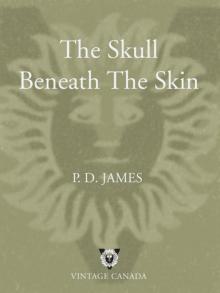 The Skull Beneath the Skin
The Skull Beneath the Skin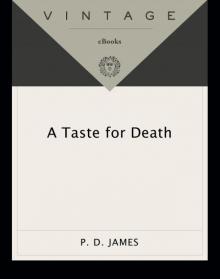 A Taste for Death
A Taste for Death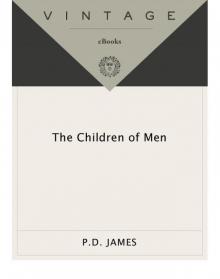 The Children of Men
The Children of Men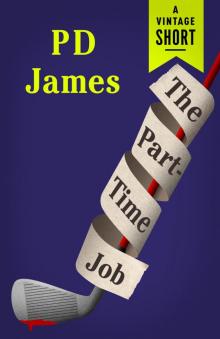 The Part-Time Job
The Part-Time Job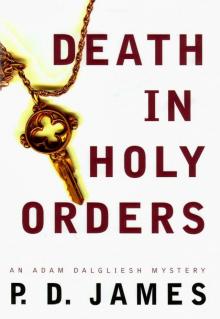 Death in Holy Orders
Death in Holy Orders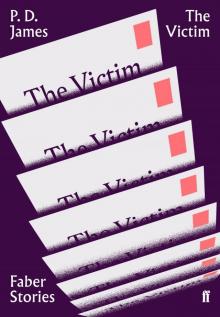 The Victim
The Victim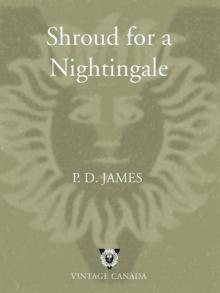 Shroud for a Nightingale
Shroud for a Nightingale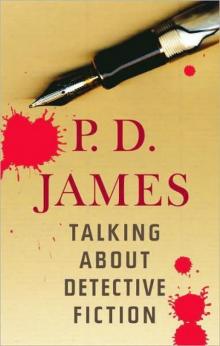 Talking about Detective Fiction
Talking about Detective Fiction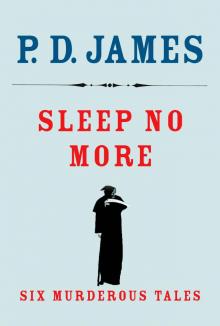 Sleep No More
Sleep No More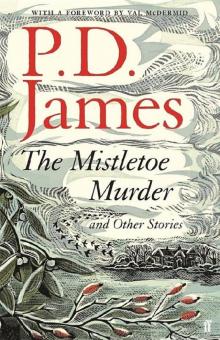 The Mistletoe Murder and Other Stories
The Mistletoe Murder and Other Stories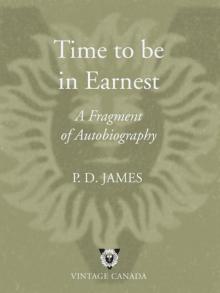 Time to Be in Earnest
Time to Be in Earnest Original Sin
Original Sin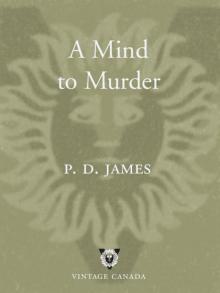 A Mind to Murder
A Mind to Murder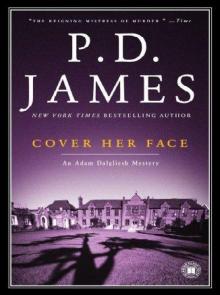 Cover Her Face
Cover Her Face Innocent Blood
Innocent Blood Devices and Desires
Devices and Desires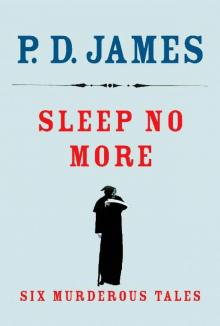 Sleep No More: Six Murderous Tales
Sleep No More: Six Murderous Tales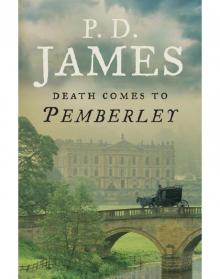 Death Comes to Pemberley
Death Comes to Pemberley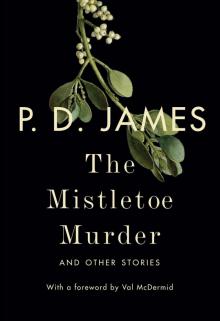 The Mistletoe Murder
The Mistletoe Murder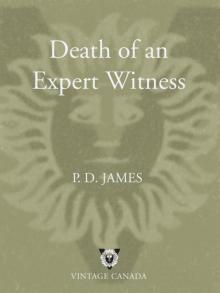 Death of an Expert Witness
Death of an Expert Witness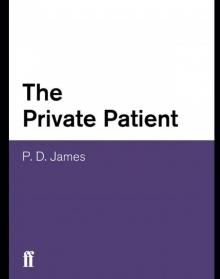 The Private Patient
The Private Patient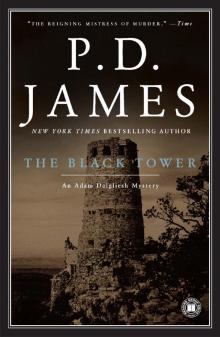 The Black Tower
The Black Tower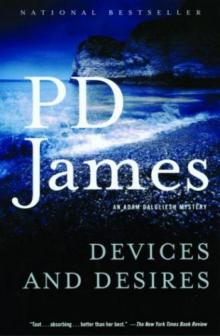 Devices & Desires - Dalgleish 08
Devices & Desires - Dalgleish 08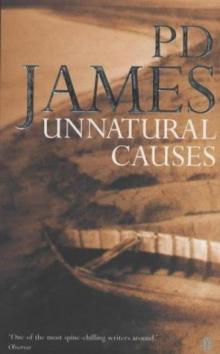 Unnatural Causes
Unnatural Causes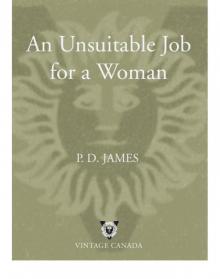 An Unsuitable Job for a Woman
An Unsuitable Job for a Woman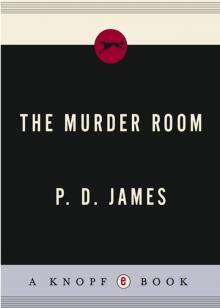 The Murder Room
The Murder Room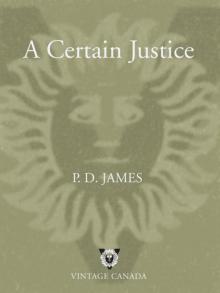 A Certain Justice
A Certain Justice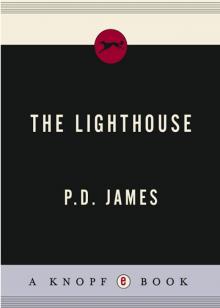 The Lighthouse
The Lighthouse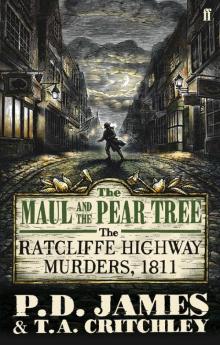 The Maul and the Pear Tree
The Maul and the Pear Tree